Is the Scottish Parliament in need of reform?
- Published
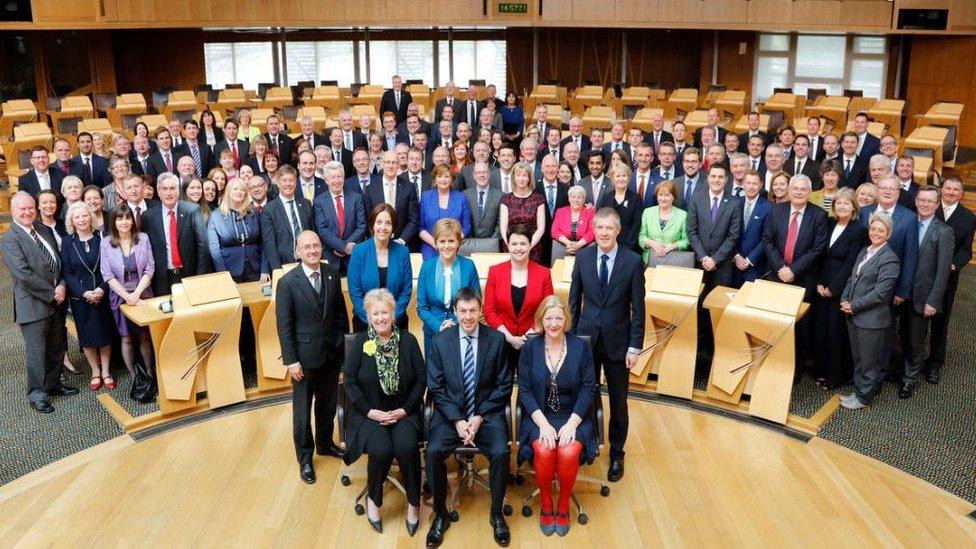
There are currently 129 MSPs at Holyrood
A commission tasked with reforming the Scottish Parliament is working on its final report. Here I look at the issues which have been raised, and what the potential solutions could be.

Does a parliament less than 20 years old need reforming?
The Commission on Parliamentary Reform was set up to give Holyrood an "MOT", on the basis that the parliament's systems "are not broken" but could do with a metaphorical lick of paint.
However, it has heard calls for "radical" reforms from former first ministers, while one peer described the parliament as "totally inadequate" in scrutinising legislation.
In fact, from the electoral system and the number of MSPs to committee structures and Holyrood's working hours, more or less every aspect of the parliament has been questioned.
One man even sent in some poems, external about how he would like Scotland to be governed.
The group is expected to submit its report to Presiding Officer Ken Macintosh in the summer - and there are some key themes which have emerged.

Call for more MSPs
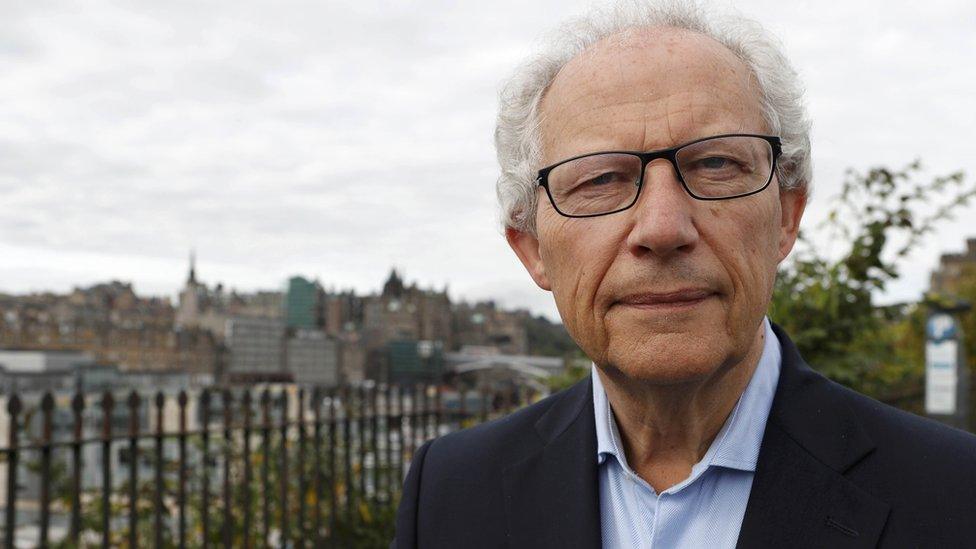
Henry McLeish gave his views on the workability of the parliament and the number of MSPs being asked to carry out that work
One of the few things that more or less all submissions to the committee agree on is that with Holyrood's powers growing, the parliament's capacity is starting to be stretched.
In his written submission, former First Minister Henry McLeish said the current number of MSPs is "incredibly limiting" given the extra powers taken on in recent years.
He said adding to the current cohort of 129 was "of vital practical importance and significance if Holyrood was to be fit for purpose in this rapidly changing political landscape".
This was backed by another former top dog, Alex Salmond, who said a "relatively modest" increase in the number of elected members could help scrutiny.
However, others have spoken out against this; a third former FM, Jack McConnell, said he was "strongly against" increasing the number of MSPs, while several others cited Scotland's relatively healthy ratio of representatives to constituents.
Commission chairman John McCormick has written that, external "much of the evidence we have received would suggest that more MSPs is not the solution", but said it was a possibility which will be examined in the final report.
Green co-convener Patrick Harvie suggested a different approach to expanding capacity. He said "significant change" was needed, with Holyrood "straining at the limits of its capacity for scrutiny", but said this could be rectified by having more public participation through consultations, crowdsourcing and "citizens' juries".
And Tory MSP Alexander Stewart suggested changing the current balance of parliament, saying there were "perhaps too many ministers", leaving "fewer backbench MSPs from the governing party to hold the executive to account".

How about working later?
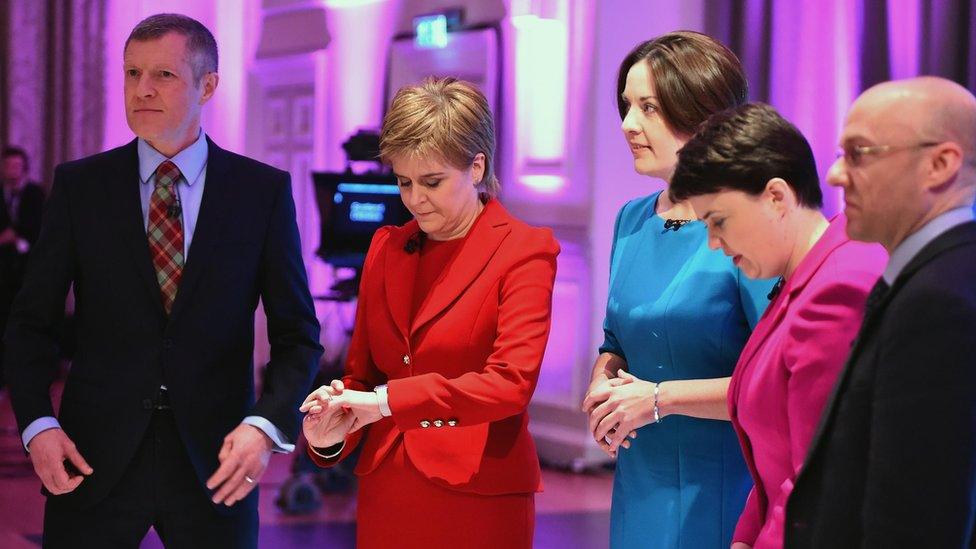
"What time have you guys got?"
Another approach to getting more work done at Holyrood examined by the commission is expanding working hours, something backed by a number of respondents.
Lord McConnell said the parliament needs to "work harder and longer", suggesting that evening sittings could add much-needed "drama" to a presently "predictable" chamber.
Lord Foulkes said parliament's "preoccupation with 'family friendly' sitting hours has seriously restricted its effectiveness", calling for sittings on weekday evenings and either Monday or Friday to allow "proper time for adequate scrutiny of legislation".
The SNP's parliamentary group suggested having more flexibility in the currently allotted time, saying the current chamber procedure discourages interventions "or more thoughtful contributions" due to the limits on speaking time.
The Labour group also backed this, suggesting the set speaking times and allocated slots per party leave "pre-written and unchallenging speeches" taking up time and "preventing quality debate".
Meanwhile, the Association for Scottish Public Affairs suggested yet another possibility - a "slower legislative process", taking more time over passing new bills so that all the possible consequences can be digested and improvements considered.

Two lots of FMQs
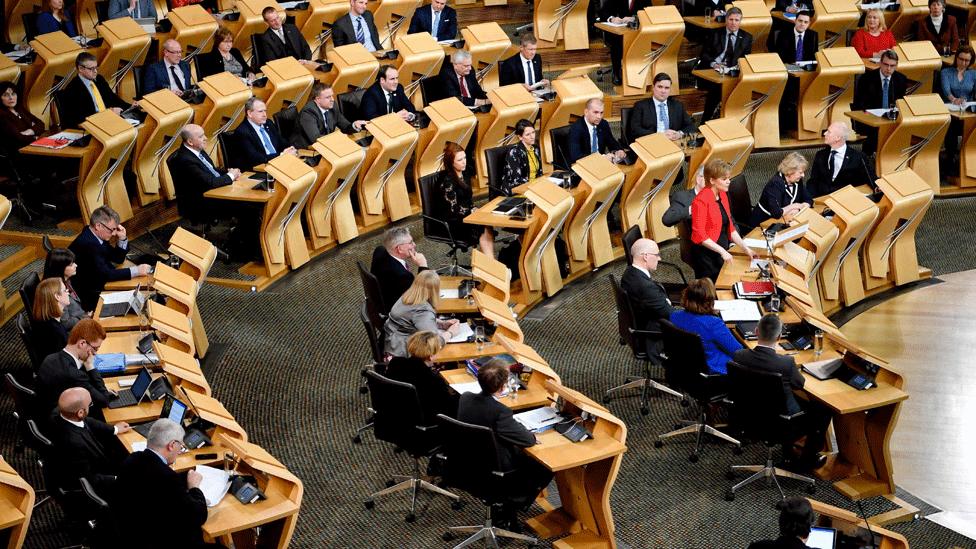
First Minister's Questions is one of Holyrood's most popular set-pieces
Perhaps the most-watched part of the parliamentary week is the Thursday session of questions to the first minister. However, the commission heard a range of complaints about these sessions and the other times when ministers are quizzed.
Lord McConnell said question times "need to change", telling the commission there were too many "non-challenging" closed questions. This was echoed by Mr Stewart, who said chances to question portfolio ministers were "extremely limited".
Lord Foulkes, meanwhile, said presiding officers "do not seem to have understood their responsibility for ensuring the effectiveness of question time", arguing that their powers should be beefed up so they can ensure ministerial replies are "short and answer directly the question asked".
Other suggestions included a time limit on contributions at FMQs to allow more speakers and more off-the-cuff backbench questions.
The SNP parliamentary group pointed out that at the likes of portfolio questions, only around half of the scheduled questions are ever asked; MSP Sandra White suggested either having more time or less questions scheduled.
She also suggested having a random draw of which question is selected next, giving members lower down the order paper a better chance of having their question selected in the chamber.
Labour also wanted to see the system of written questions shaken up, with shorter timescales for answers and "a system which has teeth".
And Action for Children Scotland suggested having two sessions of FMQs - one for party leaders to spar, and a second one where business and third sector groups could put forward questions, via MSPs.

Making the committee system more robust
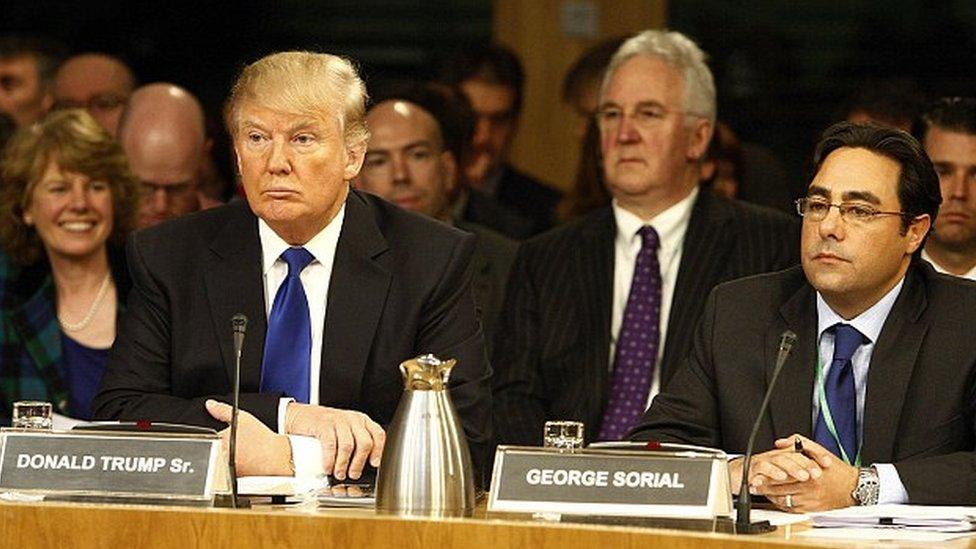
Holyrood's committees have quizzed some high-profile figures from beyond the direct orbit of Scottish politics
Holyrood's committees play a vital role in the work of parliament; and as Audit Scotland put it in its submission, with "significant new fiscal powers" exercised at Holyrood, scrutiny "has never been more important".
Some changes have already been made - such as the move in 2016 to bar ministerial aides from sitting on the committees which scrutinise their bosses - but the commission has heard calls for much more reform.
Lord McConnell was critical of how committees have performed, saying that "with a few notable exceptions, they have neither significantly influenced legislation nor the direction of national policy". He said the groups have been "more partisan and reactive than was expected", saying changes were needed to rebalance the roles of legislative scrutiny and longer-term inquiries.
Former MSP Cameron Buchanan said that during the 2011-2016 period of majority government, "most of us felt we were becoming a one-party state", saying it was vital for committees to be "robust" and "not to be cowed by the government of the day".
And current rural economy convener Edward Mountain said the groups "should be treated with more respect". He highlighted incidents where important reports were issued hours after ministers had appeared in committee and the limited time ministers are available for questioning.
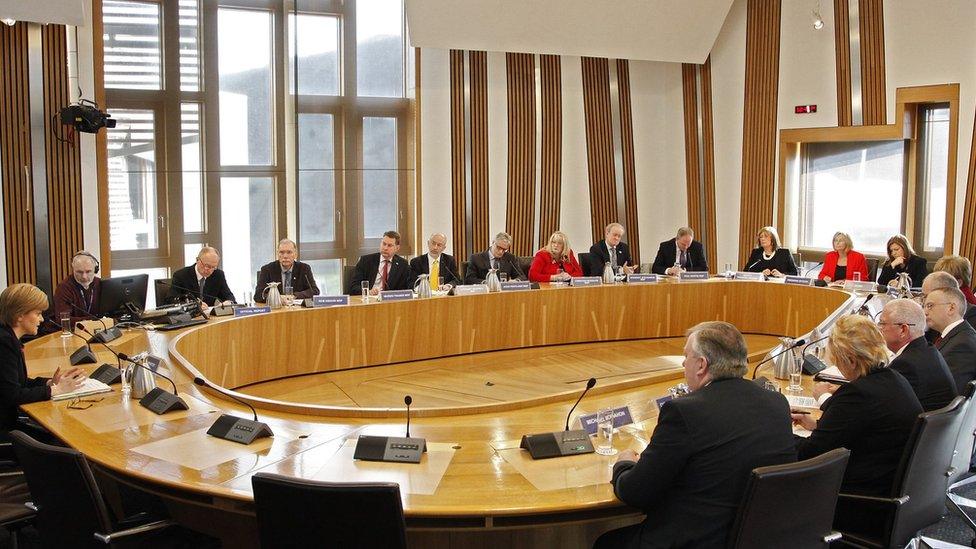
Committees have more work than ever with Holyrood's growing powers
So what could change?
There has been broad support for bringing in elections for committee conveners, as is done at Westminster. Dr Hannah White from the Institute for Government think tank said, external this could break the link between committee activity and party positions and encourage a sense of independence among conveners.
Similarly mirroring the Westminster approach, the Labour group said committee conveners should have more powers to compel witnesses to appear before them.
Several people suggested expanding the amount of time committees have to sit in, including calls to let committee and chamber business overlap.
As well as some discussion of having more members on each committee, SNP backbencher John Mason suggested having more committees in general.
The MSP suggested having smaller groups, of no more than seven members, so there could be more committees engaging with more people. "I consider it a considerable step backwards that committees have increased in size to 11," he said.
Meanwhile, the Scottish Women's Convention called for a mechanism to enforce gender balance on committees.

Term limit for MSPs and other electoral reforms
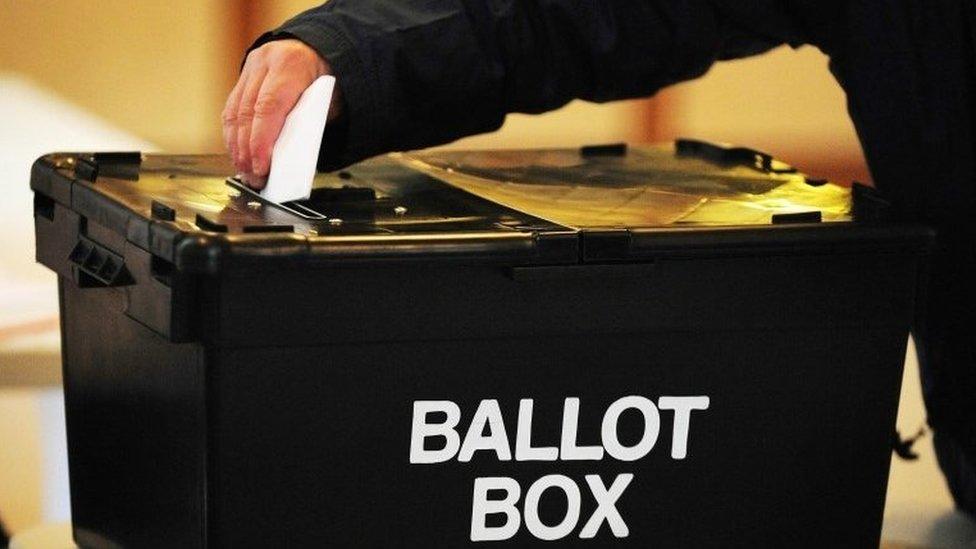
Some have suggested shaking up Holyrood's electoral system
A number of respondents suggested reforms to the additional member system (AMS) method of electing MSPs, which uses regional top-up lists as well as more traditional constituency members.
Mr McLeish said, external there was a case for "a serious look at our electoral system", saying that while the AMS system is "certainly better and more democratic" than the first-past-the-post method used at Westminster, there were "merits" to using more proportional representation.
Meanwhile, Lord McConnell wrote that the mixed-member electoral system had seen the balance between MSPs representing their constituents and their parties slip too far in favour of the latter.
He said there should be term limits on MSPs, to prevent list members having "jobs for life", and suggested candidates should have to choose between running in a constituency or on a list, not both.
Mr Salmond broadly backed AMS, but suggested that regional lists could be scrapped in favour of a single national list. He said he had "never been convinced by the regional aspect of the list", saying there was "absolutely no reason" why lists couldn't be national and "balanced across the community".
Lib Dem MSP Mike Rumbles suggested binning the current electoral system altogether, in favour of the single transferable vote (STV) method.
He said there was a public perception that list MSPs were "second class" members who made it into Holyrood by "creeping in the back door", and said using the council-style system of multi-member constituencies - larger than the current single-member constituencies but smaller than the regional list areas - would solve this.
Meanwhile, a submission from the Evangelical Alliance called for consideration of whether there was "a way of electing MSPs that is less dependent on party position or patronage".
- Published24 March 2017
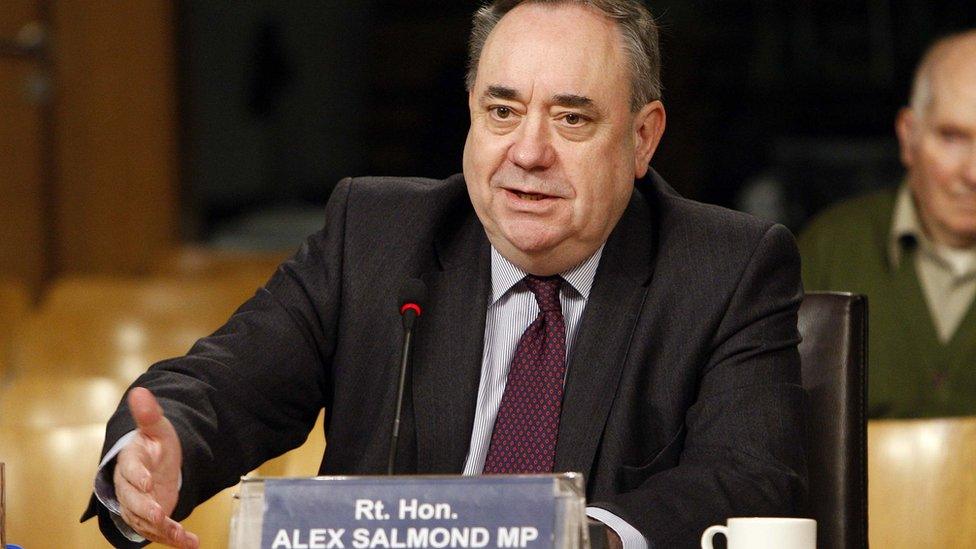
- Published16 January 2017
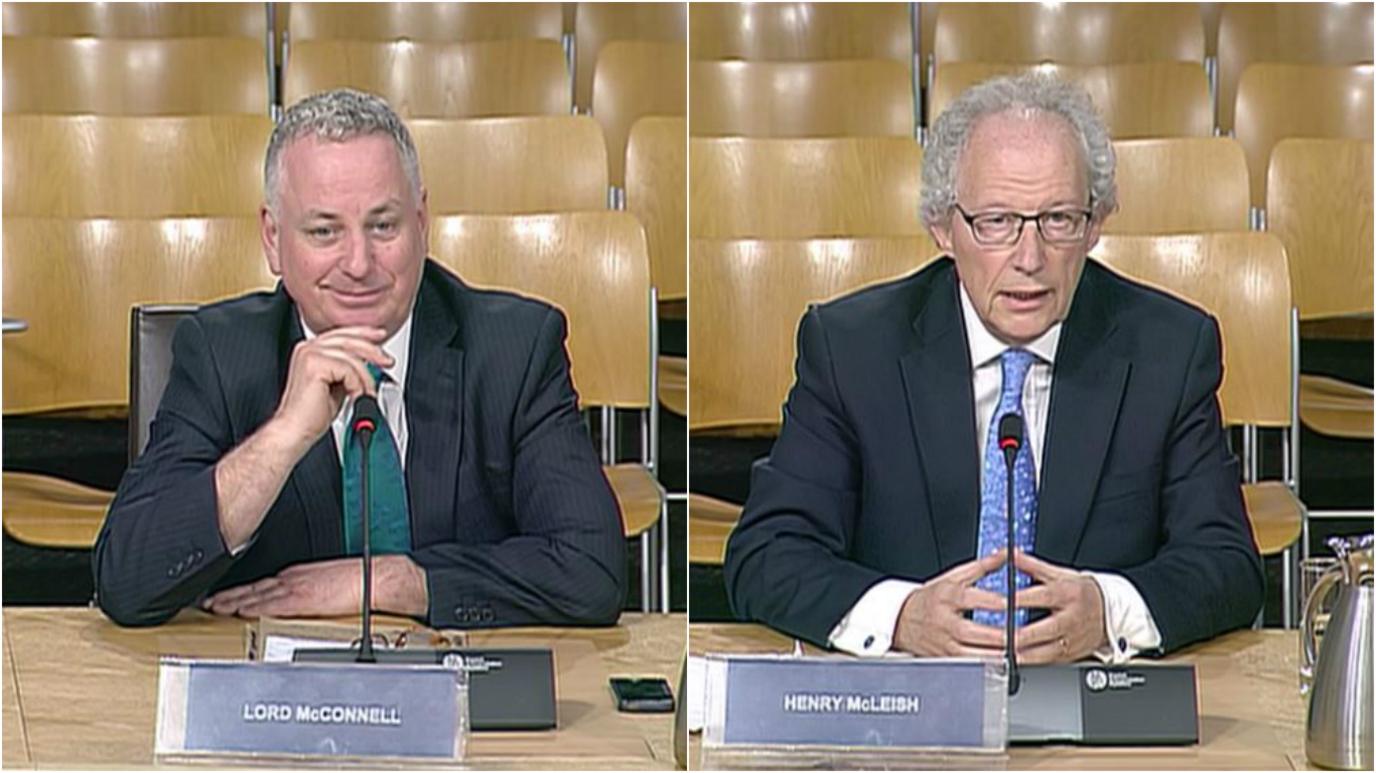
- Published12 January 2017
